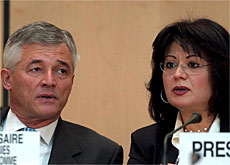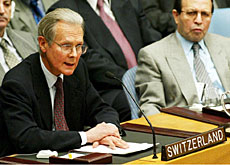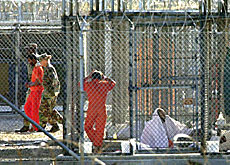Human rights talks begin as war looms

The United Nations' top human rights body began its annual session in Geneva on Monday against the backdrop of impending war against Iraq.
Participants say the crisis is likely to dominate proceedings, but Switzerland hopes other issues will not be overshadowed.
In the early hours of Tuesday morning, the United States gave Saddam Hussein and his sons a 48-hour ultimatum to leave the country or face war.
“We are all about to be tested,” said the UN High Commissioner for Human Rights, Sergio Vieira de Mello, at the opening of the session.
Around 3,000 representatives of member and observer states, as well as non-governmental organisations (NGOs), are taking part in this year’s meeting of the UN Human Rights Commission.
The purpose of their talks is to consider and condemn human rights violations around the world.
“If a conflict starts in Iraq during the commission, it will certainly influence the general atmosphere and negotiations on different important resolutions,” Jean-Daniel Vigny, a member of Switzerland’s delegation, told swissinfo.
Iraq
The delegation’s head, Peter Maurer, echoed Vigny’s comments, but insisted that a war would not create divisions between Switzerland and other delegations, including the United States.
“Iraq will be a priority for Switzerland… but we have always maintained that the Human Rights Commission should not be a forum for political debate and that it should really focus on human rights violations,” Maurer told swissinfo.
“We might agree or disagree with the use of force under a UN resolution or a non-existing resolution… but that shouldn’t affect the work of the commission,” he added.
When asked whether the killing of civilians could constitute a violation of human rights, Maurer replied that the US had always respected the Geneva Conventions, which form the backbone of international humanitarian law and were designed to protect civilians and prisoners of war during conflict.
“We might have differences from time to time in the application of certain articles of the Geneva Conventions,” said Maurer, “but let me be clear that the US does not question their applicability in times of war.”
Swiss goals
This year’s meeting marks the first time Switzerland is taking part in the commission as a full member of the UN, having joined the world body last September.
Maurer said Switzerland’s new status within the UN would lend more credibility and legitimacy to its arguments.
“What we say at the commission will be taken more seriously this year in the sense that we are now an electing member to UN bodies and we can also vote on political issues,” he told swissinfo.
Over the past seven months, Switzerland has made it clear that one of its top priorities is to become an eventual member of the UN Human Rights Commission. But the Swiss Mission to the UN understands that it’s unlikely to happen right away.
“A lot of countries want to become members of the commission so you have to carefully target when the time is ripe,” said Maurer. “We have a lot of competitors within the Western country groups, so we hope to become a member by 2007.”
As a non-member, the Swiss delegation is still entitled to voice its opinion by co-sponsoring resolutions, making declarations and engaging in informal decision shaping.
Humanitarian focus
Maurer said Switzerland’s priorities this year were in line with the country’s strong humanitarian tradition.
“We will focus very much on vulnerable groups, including children, women and minorities, as well as indigenous people and the handicapped,” he said. “Serious violations such as extra-judicial killings, the death penalty and torture are also on our agenda.”
According to Vigny, Switzerland plans to co-sponsor around 40 resolutions, including one on counter-terrorism, which is expected to be put forward by Mexico.
“The resolution will be designed to ensure that anti-terrorism measures taken by individual states conform with international humanitarian law, human rights law and refugee law,” he told swissinfo.
He said it was up to the international community to judge whether “the United States and other countries” had respected these laws in their fight against terrorism.
swissinfo, Anna Nelson in Geneva
The annual six-week session of the United Nations Human Rights Commission opened in Geneva on Monday, as timed continued to run out for Saddam.
3,000 representatives of member and observer states, as well as non-governmental organisations, are taking part.
Switzerland said a war would overshadow the discussions but that it hoped the meeting would not lose its focus on human rights violations.
Switzerland hopes to become a member of the commission by 2007.

In compliance with the JTI standards
More: SWI swissinfo.ch certified by the Journalism Trust Initiative


You can find an overview of ongoing debates with our journalists here . Please join us!
If you want to start a conversation about a topic raised in this article or want to report factual errors, email us at english@swissinfo.ch.